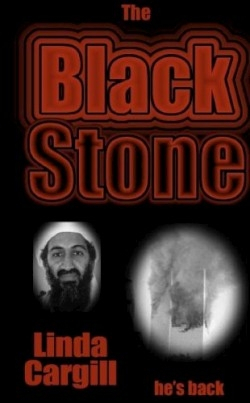The Black Stone
There is a plot to eradicate the United States of America a plot so devastating it makes 9/11 seem like a lab experiment. This plot is orchestrated by the mastermind behind it all Osama Bin Laden and it just happens to be two thousand years in the making.
This is the basis for author Linda Cargill’s latest effort that unfortunately perpetuates the stereotype that all Muslim men are terrorists intent on destroying the world in the name of Allah. Cargill even opens with a quote from Bin Laden as if trying to put the reader on edge. The action focuses on young Madeline a girl whose older brother is in war-torn Iraq and who happens upon a terror plot in her own backyard. Within the first few pages Muslim terrorists attempt to blow up her mysterious neighbor’s home with a bomb placed inside a Pepsi can. Of course Madeline understands instantly what is going on recalling her brother’s emailed picture of an IED inside of a Coke can no less. Madeline’s ever present consciousness makes regular appearances offering scores of laughable quotes; “This was Tucson not Baghdad!” From here the story unfolds with random events that make it too unbelievable forced and plotted even for commercial fiction.
As the story moves forward Cargill peppers the tale with more direct quotations from Bin Laden that help to further her point that the plot has been underway for centuries. In Dan Brown-esque style Cargill delves back in history to the time of Julius Caesar and Cleopatra in a vain attempt to bring the story full circle with vague tie-ins to a mysterious object known as the black stone and even small diagrams of the object scattered throughout the book. Sadly she fails to capture an accurate and believable dialect and voice for this section of the book: “Caesar glanced up for the first time since the battle begun. As he did the ship actually did sink… ‘Caesar they can’t swim!’ Marcus exclaimed.”
Ultimately Cargill attempts to make Allah a force so evil and unholy that it haunts generations of individuals and screams prophecies of fire and brimstone in people’s dreams. There is a distinct lack of sensitivity on Cargill’s part as she paints a picture of everyday people as Muslim extremists and their entire religion as pure evil. In the end the book does more harm than good a characteristic not fit for commercial fiction and its readers. Nevertheless the story is meticulously constructed with care that is apparent yet the characters are one-dimensional and flat from start to finish with plot twists that only segregate the story rather than bring it together.
Reviewed by
Liam Brennan
Disclosure: This article is not an endorsement, but a review. The publisher of this book provided free copies of the book and paid a small fee to have their book reviewed by a professional reviewer. Foreword Reviews and Clarion Reviews make no guarantee that the publisher will receive a positive review. Foreword Magazine, Inc. is disclosing this in accordance with the Federal Trade Commission’s 16 CFR, Part 255.

